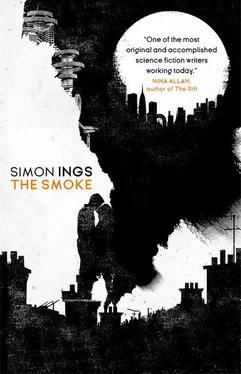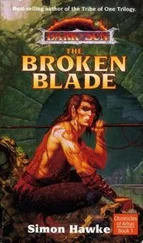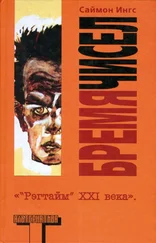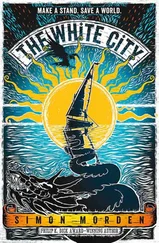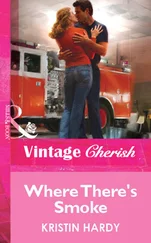Above them, up wooden stairs that were succumbing to rot, there was a shed and a greenhouse and between the two, coiled there among weeds, a hose attached to a standpipe. I looked around. I don’t know who I expected to be there, spying on me. The smell from the study had followed me even here. It didn’t make sense. I sniffed my fingers. The odour had come from the dolly. It was spreading up my wrist, my arm. I undressed. I had an erection. I turned the hose full on and doused myself. I forced my head under the biting cold water. My penis throbbed. I turned the jet on it. It bobbed under the downpour like a salmon trying to leap a fish ladder. The baked-bread smell rose through my head and milk spilled in a strong stream from my erection. The water carried it away into the earth.
I wrenched the tap shut, gathered my clothes to my chest and ran on tiptoes, shivering, up a bark-lined path, up more stairs, past a table and iron chairs, to Stella’s writing hut. The key was where I had left it, by the door under a large stone ammonite. The hut was as I had left it. I closed the door behind me, dug about in the desk drawer for matches and got the gas heater working. There was a blanket folded up on the rocking chair at the back of the room. I shook it out, scrambled into the chair and wrapped the blanket around me. I fell asleep almost immediately.
The heater woke me hours later, puttering away on fumes from the empty bottle. The room was so hot, I had to peel the blanket off my sweating skin. The hut had a glass door and I stood in the cool air seeping around its edges, watching a smeared winter sun top the edge of the hills.
Later that day, in a tea house in Clun, near the old castle, I tried to explain to Fel the decision I had come to as the sun had risen to dissolve the mist filling the valley. ‘London’s bad enough with your dad paying our rent, but this place is no different; we’d still be taking handouts from Stella. What we’d have here isn’t an ordinary life at all.’
‘What do you want to do?’
I thought about it. I thought about Fel in my bed in the shared house in Tooting. How impossibly cramped it was. How uncomfortable. How lacking in privacy. I thought about her bed, how it fell squealing out of its niche in her little studio flat in London Bridge. How house-proud she was. How clean everything was, how antiseptic. The curve of her back as she played the piano. I thought how strange and sad it was, that no stream may be stepped in twice.
‘I want an ordinary life with you. I do. Only this isn’t it.’
‘I understand,’ she said.
‘The house is a wreck.’
‘We can’t live here.’
‘No.’
‘No.’
I didn’t know what else to say.
‘We’d better call Stella,’ she said.
* * *
Fel returned to London the next day. I stayed on for several weeks to organise the refurbishment of Stella’s house. I got a private contractor in to do the extermination. By then the chickies were long gone. ‘You should have called us the moment you noticed them.’ The white-suited exterminator tutted, shaking his head at the dim-wittedness of his clientele. ‘It doesn’t do to disturb them. Once they’ve formed an attachment to a place, they’ll only keep coming back.’
I hired a firm of industrial cleaners to drive out from Telford. They arrived in a van with a rose painted in incongruous soft-lit detail on its side.
As soon as they saw the upstairs bathroom, they tried to renegotiate the price. ‘Who on earth did you have in here? Students?’
I asked Stella for any photographs she had of the cottage, and to leave me to re-create the place as best I could.
‘You don’t have to go to all that bother.’
‘I want to,’ I said. ‘It’s become a kind of project.’
It was obvious I was trying to avoid coming back home. Stella didn’t say anything, and neither did Fel. Somehow the pair of them had intuited that I needed my space.
‘Don’t forget to watch tonight,’ Stella reminded me.
The first season of DARE had begun airing on a pay-per-view channel. When I told Stella her television was broken (it wasn’t), she arranged the delivery of a set twice as large and a box to suck the relevant channel off a distant satellite. I was out of excuses, so I sat down to watch.
Stella’s style was all gloss and chrome and nylon and the shock of the new – or as close as her minuscule budget could get her. Every shot went on far too long as she squeezed every drop she could from my oh-so-brilliantly detailed mise en scène .
Episode three was called ‘Time and Tide’. It involved a plan to drain and transport the Earth’s oceans to the aliens’ homeworld using a temporal pump. Time, moving faster inside the pump, meant that water was leaving the Earth at a fantastic rate through a pipe of economical dimensions. This neat conceit not only made the device hard to find, giving the episode its narrative thread, it also kept the climactic shoot-out and destruction of the device within Stella’s modest budget.
Or that, anyway, had been the logic behind the script I had proofread for her. In execution, though, things slip about in odd directions. Stella must have been offered a deal on cheap location shooting, because the episode, which was supposed to have been a claustrophobic affair set almost entirely within the chipboard confines of DARE’s stealth submarine, had been opened out to include a romantic interlude in somebody’s back garden and moody establishing shots of the beach at Dungeness (standing in here for an exposed seabed). Towards the end of the episode, even the submarine came apart into a series of surprising real-world cutaways, including one extended sequence in which Fel, playing the submarine commander, crawls inside the ship’s weapons system to effect a vital repair. In the script, Fel’s risky adventure was conducted off-camera, via regular, increasingly desperate reports over the ship’s Tannoy system. Stella had somehow found the resources to visualise the whole thing. No wonder she had wanted me to watch the episode.
It surprised me that she had chosen to shoot in such cramped locations: there seemed very little here that Stella could not have got me to re-create in plasterboard and hot-knifed packing foam. Concrete walls and pipework; a floor with a drain. Signage whose significance escaped me but which, being in an easily legible and serifed font, no doubt belonged to the location itself rather than to Stella’s set-dressing.
At one point, Fel entered a cell-like, windowless space and took her mark behind a drain set in the floor. Her costume was a silver one-piece, sturdier than the foil-thin suits that were the usual daywear of her crew. She wore no wig: her head was close-cropped, shaved over the ears. (I remember that cut; the feel of it under my hand.) From the drain in the floor, water welled. It rose in a column, fluted and swirled by the pattern of the grating, and spread over the floor. It hit the back wall of the cell and broke, foaming: salt water. The flow strengthened and the cell began to fill. Soon the flow welling from the grate was no more than a dome of disturbance on the surface of the rising water. Inch by inch, the water rose around Fel’s body.
It was over her chest now, and in a weird breaking of the fourth wall, Fel looked directly into the camera lens. Not into the distance, as the shot seemed to demand. Right at me. The water got to her neck. The camera was mounted to match her eyeline. The water was nearly at the level of the lens. Wavelets plashed against a glass screen protecting the lens. Was the camera in a glass box, or were they shooting through a window?
The water rose over Fel’s face and the camera at the same moment, losing what was surely the most dramatic moment of the shot, the moment Fel’s face, her nose and mouth, became submerged. The image was a mess of distortions, foam, shadows, gloom. Not until the water level had risen above the lens did the scene stabilise.
Читать дальше
